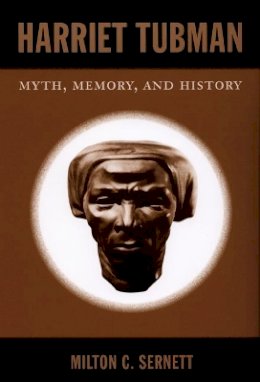
Harriet Tubman: Myth, Memory, and History
Milton C. Sernett
Three biographies of Harriet Tubman were published within months of each other in 2003–04; they were the first book-length studies of the “Queen of the Underground Railroad” to appear in almost sixty years. Sernett examines the accuracy and reception of these three books as well as two earlier biographies first published in 1869 and 1943. He finds that the three recent studies come closer to capturing the “real” Tubman than did the earlier two. Arguing that the mythical Tubman is most clearly enshrined in stories told to and written for children, Sernett scrutinizes visual and textual representations of “Aunt Harriet” in children’s literature. He looks at how Tubman has been portrayed in film, painting, music, and theater; in her Maryland birthplace; in Auburn, New York, where she lived out her final years; and in the naming of schools, streets, and other public venues. He also investigates how the legendary Tubman was embraced and represented by different groups during her lifetime and at her death in 1913. Ultimately, Sernett contends that Harriet Tubman may be America’s most malleable and resilient icon.
Product Details
About Milton C. Sernett
Reviews for Harriet Tubman: Myth, Memory, and History
Jane E. Dabel
Reviews in American History
“Sernett has crafted a meticulous study of Harriet Ross Tubman and the scholarship, oral histories, and cultural records that have both fueled and challenged her status as an American icon, patriot, and resister. . . . The power of the work lies in its rigorous close readings of the contexts, cultural battles, and historical moments that informed the writerly efforts of abolitionists such as Sarah Bradford, journalists like the Auburn resident Earl Conrad, educators like Bessie Cooper Noble, and the artists and writers whose creative genius facilitated important public encounters with Tubman’s legacy. Sernett’s keen attention to the evolution of identity politics and the changing manifestations of racial uplift enables a stirring and informative rereading of Tubman’s multifaceted story, and a heightened awareness of the racialized and gendered components of the often sentimentalized and politicized ‘American’ story.”
Lois Brown
North Carolina Historical Review
“Sernett has successfully tilled the territory that historical memory calls us to enter. Not only has he recovered a significant portion of our past with regard to an important figure, but also he has opened the window on how myths are made, why they do not easily die, and in the end why we must embrace and own the truth about our past. Harriet Tubman: Myth, Memory, and History is an admirable achievement for a historian, and we should be grateful to Sernett for this valuable work.”
Charles Pete Banner-Haley
Journal of Southern History
“Sernett’s Harriet Tubman is a rich, informative, well-documented study by a noted historian of the African American experience who has written about antislavery activities and African American religion as well as a significant work on the Great Migration.”
Margaret Washington
Journal of African American History
“Sernett’s richly textured study is not foremost a biography but an analysis of the interplay of individual and collective history-making, myth-making, and the cultural memories surrounding Tubman. [A]n impressively researched and fascinating book . . . [that] makes significant contributions to deeper understandings of the place of memory in American history and political culture widely.”
Micki McElya
American Historical Review
